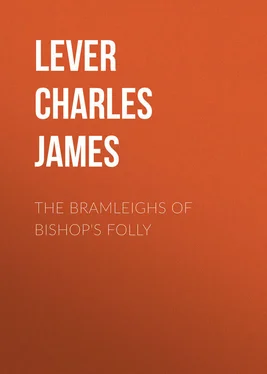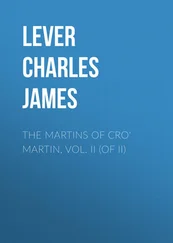Charles Lever - The Bramleighs of Bishop's Folly
Здесь есть возможность читать онлайн «Charles Lever - The Bramleighs of Bishop's Folly» — ознакомительный отрывок электронной книги совершенно бесплатно, а после прочтения отрывка купить полную версию. В некоторых случаях можно слушать аудио, скачать через торрент в формате fb2 и присутствует краткое содержание. Издательство: Иностранный паблик, Жанр: literature_19, foreign_antique, foreign_prose, на английском языке. Описание произведения, (предисловие) а так же отзывы посетителей доступны на портале библиотеки ЛибКат.
- Название:The Bramleighs of Bishop's Folly
- Автор:
- Издательство:Иностранный паблик
- Жанр:
- Год:неизвестен
- ISBN:нет данных
- Рейтинг книги:4 / 5. Голосов: 1
-
Избранное:Добавить в избранное
- Отзывы:
-
Ваша оценка:
- 80
- 1
- 2
- 3
- 4
- 5
The Bramleighs of Bishop's Folly: краткое содержание, описание и аннотация
Предлагаем к чтению аннотацию, описание, краткое содержание или предисловие (зависит от того, что написал сам автор книги «The Bramleighs of Bishop's Folly»). Если вы не нашли необходимую информацию о книге — напишите в комментариях, мы постараемся отыскать её.
The Bramleighs of Bishop's Folly — читать онлайн ознакомительный отрывок
Ниже представлен текст книги, разбитый по страницам. Система сохранения места последней прочитанной страницы, позволяет с удобством читать онлайн бесплатно книгу «The Bramleighs of Bishop's Folly», без необходимости каждый раз заново искать на чём Вы остановились. Поставьте закладку, и сможете в любой момент перейти на страницу, на которой закончили чтение.
Интервал:
Закладка:
“I’m quite abroad as to all his tastes and habits. I only know so much of him as pertains to his character in the ‘line,’ but I ‘ll go and write my note. I ‘ll come back and show you what I have said,” added he, as he gained the door.
When Marion was left alone to reflect over her brother’s words, she was not altogether pleased. She was no convert to his opinions as to the necessity of any peculiar stratagem in the campaign of life. She had seen the house in town crowded with very great and distinguished company; she had observed how wealth asserted itself in society, and she could not perceive that in their acceptance by the world there was any the slightest deficiency of deference and respect. If they had failed in their county experiment in England, it was, she thought, because her father rashly took up an extreme position in politics, a mistake which Augustus indeed saw and protested against, but which some rash advisers were able to over-persuade the Colonel into adopting.
Lady Augusta, too, was an evidence that the better classes did not decline this alliance, and on the whole she felt that Temple’s reasonings were the offshoots of his peculiar set; that small priesthood of society who hold themselves so essentially above the great body of mankind.
“Not that we must make any more mistakes, however,” thought she. “Not that we can afford another defeat;” and as she arrived at this sage judgment, Temple entered, with some sheets of note-paper in his hand.
“I ‘m not quite satisfied with any of these, Marion; I suspect I must just content myself with a mere formal ‘requests the company.’”
“Let me hear what you have said.”
“Here ‘s the first,” said he, reading. “‘My dear Lord, – The lucky accident of your Lordship’s presence in this neighborhood – which I have only accidentally learned.’”
“Oh, dear, no! that’s a chapter of 4 accidents.’”
“Well; listen to this one: ‘If I can trust to a rumor that has just reached us here, but which, it is possible our hopes may have given a credence to, that stern fact will subsequently deny, or reject, or contradict.’ I ‘m not fully sure which verb to take.”
“Much worse than the other,” said Marion.
“It’s all the confounded language; I could turn it in French to perfection.”
“But I fancied your whole life was passed in this sort of phrase-fashioning, Temple,” said she, half smiling.
“Nothing of the kind. We keep the vernacular only for post-paper, and it always begins: ‘My Lord, – Since by my despatch No. 7,028, in which I reported to your Lordship the details of an interview accorded me by the Secretary of State for Foreign Affairs of this Government;’ and so on. Now all this, to the polite intercourse of society, is pretty much what singlestick is to the rapier. I wish you ‘d do this for me, Marion. After so many balks, one always ends by a tumble.”
“I declare, I see no occasion for smartness or epigram. I ‘d simply say, ‘I have only just heard that you are in our neighborhood, and I beg to convey my father’s hope and request that you will not leave it without giving us the honor of your company here.’ You can throw in as many of your personal sentiments as may serve, like wool in a packing-case, to keep the whole tight and compact; but I think something like that would suffice.”
“Perhaps so,” said he, musingly, as he once more returned to his room. When he reappeared, after some minutes, it was with the air and look of a man who had just thrown off some weighty burden. “Thank Heaven, it’s done and despatched!” said he. “I have been looking over the F. O. Guide, to see whether I addressed him aright. I fancied he was a Privy Councillor, and I find he is not; he is a K.C.B., however, and a Guelph, with leave to wear the star.”
“Very gratifying to us, – I mean if he should come here,” said she, with a mocking smile.
“Don’t pretend you do not value all these things fully as much as myself, Marion. You know well what the world thinks of them. These distinctions were no more made by us than the money of the realm; but we use one of them like the other, well aware that it represents a certain value, and is never disputed.”
“How old is your friend?”
“Well, he is certainly not young. Here’s what F. O. contributes to his biography. ‘Entered the army as cornet in the 2nd Life Guards, 1816.’ A precious long time ago that. ‘First groom of the bedchamber – promoted – placed on half-pay – entered diplomatic service – in – 19; special mission to Hanover – made K.C.B. – contested Essex, and returned on a petition – went back to diplomacy, and named special envoy to Teheran.’ Ah! now we are coming to his real career.”
“Oh, dear! I ‘d rather hear about him somewhat earlier,” said she, taking the book out of his hand, and throwing it on the table. “It is a great penalty to pay for greatness to be gibbeted in this fashion. Don’t you think so, Temple?”
“I wish I could see myself gibbeted, as you call it.”
“If the will makes the way, we ought to be very great people,” said she, with a smile, half derisive, half real. “Jack, perhaps not; nor Ellen. They have booked themselves in second-class carriages.”
“I’ll go and look up Harding; he is a secret sort of a fellow. I believe all agents assume that manner to every one but the head of the house and the heir. But perhaps I could manage to find out why these people have not called upon us; there must be something in it.”
“I protest I think we ought to feel grateful to them; an exchange of hospitalities with them would be awful.”
“Very likely; but I think we ought to have had the choice, and this they have not given us.”
“And even for that I am grateful,” said she, as with a haughty look she rose and left the room.
CHAPTER VI. UP IN THE MOUNTAINS
About eighteen miles from Bishop’s Folly, and in the very midst of the Mourne Mountains, a low spur of land projects into the sea by a thin, narrow promontory, so narrow, indeed, that in days of heavy sea and strong wind, the waves have been seen to meet across it. Some benevolent individual had once conceived the idea of planting a small lighthouse here, as a boon to the fishermen who frequent the coast. The lighthouse was built, but never occupied, and after standing some years in a state of half ruin, was turned into a sort of humble inn or shebeen, most probably a mere pretext to cover its real employment as a depot for smuggled goods; for in the days of high duties French silks and brandies found many channels into Ireland besides the road that lay through her Majesty’s customs. Mr., or, as he was more generally called, Tim Mackessy, the proprietor, was a well-known man in those parts. He followed what in Ireland for some years back has been as much a profession as law or physic, and occasionally a more lucrative line than either, – Patriotism. He was one of those ready, voluble, self-asserting fellows, who abound in Ireland, but whose favor is not the less with their countrymen from the fact of their frequency. He had, he said, a father, who suffered for his country in ninety-eight; and he had himself maintained the family traditions by being twice imprisoned in Carrickfergus jail, and narrowly escaping transportation for life. On the credit of this martyrdom, and the fact that Mr. O’Connell once called him “honest Tim Mackessy,” he had lived in honor and repute amongst such of his countrymen as “feel the yoke and abhor the rule of the Saxon.”
For the present, we are, however, less occupied by Tim and his political opinions than by two guests, who had arrived a couple of days before, and were now seated at breakfast in that modest apartment called the best parlor. Two men less like in appearance might not readily be found. One, thin, fresh-looking, with handsome but haughty features, slightly stooped, but to all seeming as much from habit as from any debility, was Lord Culduff; his age might be computed by some reference to the list of his services, but would have been a puzzling calculation from a mere inspection of himself. In figure and build, he might be anything from five-and-thirty to two or three and forty; in face, at a close inspection, he might have been high up in the sixties.
Читать дальшеИнтервал:
Закладка:
Похожие книги на «The Bramleighs of Bishop's Folly»
Представляем Вашему вниманию похожие книги на «The Bramleighs of Bishop's Folly» списком для выбора. Мы отобрали схожую по названию и смыслу литературу в надежде предоставить читателям больше вариантов отыскать новые, интересные, ещё непрочитанные произведения.
Обсуждение, отзывы о книге «The Bramleighs of Bishop's Folly» и просто собственные мнения читателей. Оставьте ваши комментарии, напишите, что Вы думаете о произведении, его смысле или главных героях. Укажите что конкретно понравилось, а что нет, и почему Вы так считаете.












